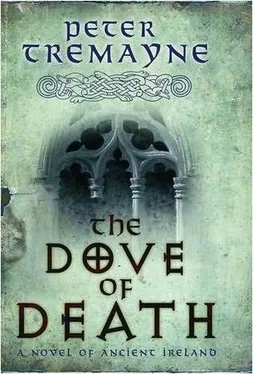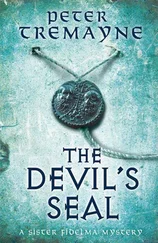Peter Tremayne - The Dove of Death
Здесь есть возможность читать онлайн «Peter Tremayne - The Dove of Death» весь текст электронной книги совершенно бесплатно (целиком полную версию без сокращений). В некоторых случаях можно слушать аудио, скачать через торрент в формате fb2 и присутствует краткое содержание. Жанр: Исторический детектив, на английском языке. Описание произведения, (предисловие) а так же отзывы посетителей доступны на портале библиотеки ЛибКат.
- Название:The Dove of Death
- Автор:
- Жанр:
- Год:неизвестен
- ISBN:нет данных
- Рейтинг книги:5 / 5. Голосов: 1
-
Избранное:Добавить в избранное
- Отзывы:
-
Ваша оценка:
- 100
- 1
- 2
- 3
- 4
- 5
The Dove of Death: краткое содержание, описание и аннотация
Предлагаем к чтению аннотацию, описание, краткое содержание или предисловие (зависит от того, что написал сам автор книги «The Dove of Death»). Если вы не нашли необходимую информацию о книге — напишите в комментариях, мы постараемся отыскать её.
The Dove of Death — читать онлайн бесплатно полную книгу (весь текст) целиком
Ниже представлен текст книги, разбитый по страницам. Система сохранения места последней прочитанной страницы, позволяет с удобством читать онлайн бесплатно книгу «The Dove of Death», без необходимости каждый раз заново искать на чём Вы остановились. Поставьте закладку, и сможете в любой момент перейти на страницу, на которой закончили чтение.
Интервал:
Закладка:
Fidelma remembered Trifina’s estimation of her brother. Then she recalled that Trifina had identified Barbatil as the father of Argantken, Macliau’s companion at the fortress.
‘A man’s character as a womaniser does not make him a murderer,’ she replied.
‘No woman is safe from his lechery — and even the Church,’ Barbatil gestured towards Brother Metellus, ‘does not chide him for his debauchery — just because he is the son of the mac’htiern whose flag now inspires terror throughout this peninsula.’
‘You say that men bearing the emblem of Brilhag made these raids. Did you ever go to demand an explanation from Brilhag?’
‘At first we did,’ blustered Barbatil. ‘We saw the lady Trifina. She spoke in the absence of her father, Lord Canao. Macliau was not there. She claimed that no warriors of Brilhag were involved. She promised that she would take up our cause and find out who these people were. Nothing has been done.’
‘I ask, yet again, where is your evidence that Macliau is responsible?’ Fidelma demanded doggedly.
‘Evidence? You ask for evidence?’ Spittle edged the farmer’s mouth. ‘Did not this immoral libertine debauch my own daughter, Argantken! I accuse him of murder in her name!’
There was an angry murmur when the girl’s name was pronounced.
‘If Argantken is accusing him of murder, let her come forward and do so,’ Fidelma said stubbornly.
The anger of the crowd seemed to increase.
‘She cannot!’ replied the farmer, barely keeping his temper. ‘For she was his victim!’
Fidelma stared at Barbatil for a moment, taking in his words.
‘Argantken, your daughter, has been murdered?’
‘Have I not said as much?’
Fidelma’s mind raced for a moment or two and then she faced the man with a softened expression.
‘I am sorry for your trouble, my friend. But we must have some facts to work on, to resolve this matter. Rest assured, justice will be yours. But, I say again, it will be justice — and not revenge . Tell me the facts as you know them.’
The shoulders of the farmer, Barbatil, slumped a little as if there were a heavy weight on them.
‘It was not long ago that Macliau turned his lustful attention on my daughter. She is…she was…attractive — the apple of her mother’s eye and of mine too. She was a good daughter until he rode by our farmhouse one morning and coaxed her with honeyed words to ride away with him. She believed his promises of marriage and riches — as if the daughter of a poor farmer could ever become wife to the lord of Brilhag. She was too naïve and too trusting.’
‘Go on,’ coaxed Fidelma.
‘I pleaded with her to return to the farm, but she would have none of it. She believed that scoundrel’s lies and promises. Yesterday morning, word came to me that Argantken and Macliau had been seen riding along the coast at Kerignard, which is not far from my farm. I decided to make one last attempt to persuade my daughter to come back to her mother’s home. But knowing that Macliau had some warriors with him, I asked some of my neighbours to go with me.’
‘How many?’ Fidelma interrupted.
‘Two or three of those who are here with me now.’ Barbatil gestured to those around him, who muttered in agreement.
‘And then?’
‘We went to Kerignard. I knew the little ruined oratory where Macliau had camped on other hunting trips. I suspected he would be there.’
‘A ruined oratory?’
‘It is an old stone oratory along that coast by Kerignard. There are cliffs all along that coast, and on the top of them is the oratory, which was built and deserted many years ago.’
‘And was he there?’
‘When we arrived we saw no sign of his warriors or huntsmen. I was not even going to look in the oratory until I realised that there was a loose horse wandering behind it. I went to the oratory — there was no door, it had rotted away years before, so the place was open — and the first thing I saw was Macliau, lying on the floor in a drunken stupor.’
‘How did you know that he was drunk?’
‘The smell of intoxicating liquor was strong. Macliau smelled as if he had just crawled out of a cider vat.’
‘So he was lying there drunk. What then?’ continued Fidelma, trying to keep the man calm.
‘Beside him on the ground was…was my daughter! Argantken.’ His voice caught. ‘She was dead. There was blood all over the place. A dagger, Macliau’s dagger, was buried in her lifeless form.’
‘How do you know it was Macliau’s dagger?’
‘Everyone knows the emblem of the lords of Brilhag. It bore the emblem of the dove…the emblem of peace.’
His voice ended in a cry of almost physical pain. The crowd growled ominously and seemed to surge forward.
‘Patience!’ cried Fidelma, through the translation of Brother Metellus. ‘I have promised this man justice but I need answers to more questions.’
She turned back to Barbatil.
‘A few more questions,’ she repeated softly. ‘For your daughter will not rest quietly if the truth remains unknown.’
‘What more do you want?’ grunted the farmer, recovering his composure. ‘The evidence explains itself.’
‘Having come on this terrible scene, what did you do?’
‘One of my neighbours took the dagger from her breast and covered her body.’
‘Do you still have the dagger?’
‘Coric, do you still have the dagger?’ asked the farmer, turning to one of his companions.
A small man, whose short stature belied his thick, muscular body, came forward and held up a knife. Fidelma took it: it was exactly the same design as the one she had found in the body of Abbot Maelcar. The same emblem of a dove was engraved on it.
‘I will keep this as evidence,’ she said. ‘And then…what of Macliau? What did you do then?’
The farmer scowled. ‘He was drunk. We tried to rouse him. We hit him across the cheeks, but he was too far gone to respond. So we carried him outside and threw him in a stream. Even then it took us time to make the swine come to and comprehend his surroundings. Finally we told him that we were going to hang him for what he had done.’
The little man, the one who had been addressed as Coric, spoke for the first time.
‘He started weeping like a child, pleading with us for his life, even claiming that he was not responsible and knew nothing of the killing. The lies that poured from his cowardly mouth made us sick.’
‘We took Argantken’s body back to my farm,’ continued Barbatil, ‘so that my wife and family could mourn her in the proper manner. And we took Macliau to my pigpen and locked him in. We decided that we would hang him after we had interred my daughter’s body. That was to be midday today.’
‘So what happened?’
‘We buried my daughter. All these good folks came,’ he encompassed his companions with a motion of his arm. ‘Then we went to the pigpen. We found Macliau had managed to break free. We soon picked up his trail and it led us here. The coward has taken refuge in the chapel but we will drag him out like the animal he is and-’
‘You will do no such thing. I have promised you justice and we,’ Fidelma threw an arm towards the religious and the warriors, ‘will not countenance vengeance. Vengeance only breeds more vengeance. Do you know what sanctuary is?’
Barbatil snorted derisively, replying, ‘Just a cunning means to prevent the guilty from punishment.’
‘No, my friend, it is a means to prevent injustice. The Church recognises the right of giving protection to all peoples. Asylum is recognised by all civilised people, and rules and laws are devised to govern it. For a person to qualify for the protection of the Church there are rules, my friend. Rules not only for them to qualify, but rules as to how long that protection may be extended. So I tell you this: I must now hear what the accused has to say in his defence. When the evidence is heard, then — and only then — can a judgement be made.’
Читать дальшеИнтервал:
Закладка:
Похожие книги на «The Dove of Death»
Представляем Вашему вниманию похожие книги на «The Dove of Death» списком для выбора. Мы отобрали схожую по названию и смыслу литературу в надежде предоставить читателям больше вариантов отыскать новые, интересные, ещё непрочитанные произведения.
Обсуждение, отзывы о книге «The Dove of Death» и просто собственные мнения читателей. Оставьте ваши комментарии, напишите, что Вы думаете о произведении, его смысле или главных героях. Укажите что конкретно понравилось, а что нет, и почему Вы так считаете.











